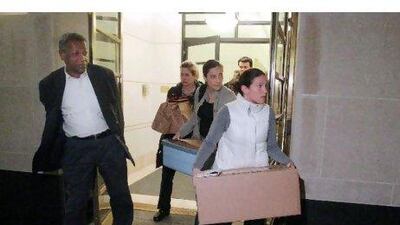It used to be big news when hedge funds were subpoenaed in a federal investigation.
These days, finding a US hedge fund that isn't being quizzed by the FBI, the US attorney office's or the Securities and Exchange Commission (SEC) as part of their latest investigation into insider trading is a much bigger stretch.
Only three funds, Level Global Investors and Diamondback Capital Management in Connecticut and Loch Capital Management in Boston, were raided by the FBI last week as part of an ongoing federal investigation into whether hedge funds, and the consultant companies that connect them with industry experts, have been sharing information that is not public.
But what began as an insider trading inquiry at the Galleon Group, a New York hedge fund, three years ago has turned into an investigation of what is alleged to be multiple interconnected insider trading rings- and almost 40 hedge funds, mutual funds, investment banks and consultants have received subpoenas.
And a barrage of subpoenas does not make a case. To date, only Don Ching Trang Chu, who worked for Primary Global Research, a consultant or so-called expert networking firm paid to link industry insiders with investment managers, has been arrested.
He has been charged with providing Richard Choo-Ben Lee, an analyst at an unidentified hedge fund, with inside information about three telecommunications companies, Atheros Communications, Broadcom and Sierra Wireless, in return for payments.
It is true that The Wall Street Journal reported last week that federal authorities plan to make many more civil and criminal charges by the end of the year.
It is also true that some of Wall Street's top firms at the very least will have a lot of explaining to do.
Take the example of SAC Capital Advisors, one of the largest hedge funds to have been subpoenaed.
Richard Choo-Ben Lee, whose co-operation with authorities has led to the most recent charges against Mr Chu, has already pleaded guilty to insider trading in his former job at SAC. On top of that, two of the funds that were raided last week were founded by ex-SAC Capital staff and at least one expert network provider has revealed he was asked by the FBI to wear a wire to glean more information about SAC, among others. However, the scope of this investigation does not mean that a culture of insider trading is pervasive in the industry.
What it certainly demonstrates, though, is that following the Bernie Madoff debacle and others, federal authorities cannot afford to miss any sign of investment fraud.
The SEC's enforcement division has a new mandate to aggressively pursue insider trading cases and the US attorney's office is also making a crackdown on insider trading a priority.
As a result, they are launching investigations a lot more quickly. It used to take months for the SEC to approve subpoenas. Now, if it believes a fund has information about insider trading, or even information about another fund's insider trading, it can issue a subpoena within a week.
Whereas the SEC used to take three to four years carefully developing a case, now it is more interested in taking testimony and trying to get the target to agree to an early plea agreement and settlement before it moves on to the next fund.
The authorities are not even waiting for subpoenas anymore to find the information they want. The FBI successfully debuted secret wire taps to collect evidence during the Galleon insider trading investigation and it looks keen to offer information gleaned through this method to press further charges.
This latest federal crackdown could result in some serious criminal charges within an industry that has already been tarnished over the past few years by a series of high-profile investment frauds.
For now, though, the only thing that is conclusive about the scope of this investigation is that federal authorities are throwing a lot more mud around these days in the hope that some will stick.

